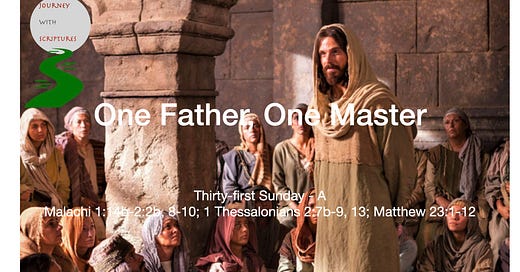Malachi 1:14b-2:2b, 8-10; 1 Thessalonians 2:7b-9, 13; Matthew 23:1-12
"For the lips of a priest should guard knowledge, and people should seek instruction from his mouth, for he is the messenger of the Lord of hosts" (Mal. 2:7). But, the priests in the time of Malachi did not keep God's ways (Mal. 2:8-9), and the scribes and the Pharisees did not practice what they taught to others (Matt. 23:3-4).
"Do and observe whatever they tell you, but not the works they do. For they preach, but do not practice" (Matt. 23:3). We call this attitude hypocrisy and its worst example is someone who teaches God's commandments but at the same time transgresses them, thus dishonoring God and becoming a scandal to others (Rom. 2:21-24). "They do all their deeds to be seen by others" (Matt. 23:5). Phylacteries are leather bands and a prayer box worn on the arm and the forehead, while the fringes are sewn to the edges of the garments. Both were intended to remind Israel of God's commandments and not to be ostentatiously shown as a sign of one's piety (Num. 15:37-41; Deut. 6:8).
"They love the place of honor at feasts" (Matt. 23:6). The scribes and the Pharisees usurp the seat of Moses but do not imitate his humility (Matt. 23:2; Num. 12:3). Moreover, instead of "loving" God and neighbor, which the phylacteries and fringes were supposed to remind them of, they "love" the signs of their prestige: first places in synagogues, greetings in the markets, and titles - "Rabbi - my great one", "father", and "leader" (Matt. 23:6-10). Such attitude threatens every social and religious group, therefore Jesus instructs his disciples to guard against it.
"But you are not to be called rabbi" (Matt. 23:8). Mary sitting at the feet of Jesus and listening to His word perfectly illustrates the meaning of this statement (Luke 10:39). We will forever remain Christ's disciples, our only Teacher. "And call no man your father on earth" (Matt. 23:9). When Stalin died, everyone in the communist countries was ordered to mourn him, giving him the title of the” father of the nation." But my father, standing on the schoolyard, said: "My father is at home". "Father" is not a title one can usurp, but a holy word that belongs to God alone (Mal. 2:10), and by analogy to our fathers (Eph. 3:14-15).
"The greatest among you shall be your servant" (Matt. 23:11). When James and John wanted for themselves first places in Christ's glory and the remaining apostles hearing about it got angry, Jesus spoke similar words (Mark 10:35-45, v.44). The world and the Church are governed by opposite principles. While leaders of the nations abuse their power, there is no place for such things in the Church. Jesus is our Lord and Teacher. In Him alone, we place our hope (Ps. 131:3) and we imitate Him by serving others (John 13:4-5,12-15). Saint Paul is an example of such an attitude.
Unlike the scribes and the Pharisees who tied up heavy burdens, the apostle did not want to be a burden to the faithful in Thessalonica (1 Thess. 2:9). He preferred to give rather than to receive (1 Cor. 9:14-18), to be "like the scum of the world" than to take the best seats at feasts and in the synagogues (1 Cor. 4:13, Matt. 23:6). Those to whom he preached the Gospel of God became so dear to him that he was ready to sacrifice his own life for them (1 Thess. 2:8). No wonder that this attitude bore much fruit (1 Thess. 2:13).
The Church proclaims that there is One God and Father of all, One Lord Jesus Christ, One Holy Spirit, one life, one faith, one baptism, and one hope, and all believers form one body of Christ (1 Cor. 8:6; Eph. 4:4-6; Heb. 9:27). This recurring number "one" shows us where we come from, where we are going, and who we are. Created by God, we journey towards God, through baptism we have entered the Church - the family of God’s children, and become brothers and sisters in Christ - our Master.




